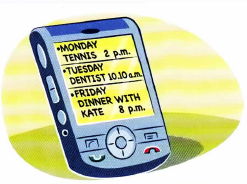Present tenses for the future
(I am doing / I do)
Present continuous (I am doing) with a future meaning.
Present continuous 는 미래의미를 내포하고 있다.
This is Ben's diary for next week.
이건 밴의 다음주 일정이다.
- He is playing tennis on Monday afternoon.
그는 월요일 오후에 테니스활동이 있다. - He is going to the dentist on Tuesday morning.
그는 화요일 아침에 치과에 갈것이다. - He is having dinner with Kate on Friday.
그는 금요일날 케이트와 저녁을 먹을것이다.
In all these examples, Ben has already decided and arranged to do these things.
예문에서 밴은 이미 결정하였고, 그것들을 할 예정이다.
I'm doing something (tomorrow) = I have already decided and arranged to do it.
나는 이미 결정했고 그것을 할 예정이다.
예문) 해석참고용
- A: What are you doing on Saturday evening? (not What do you do)
A: 토요일 저녁에 뭘 할거야? - B: I'm going to the theatre. (not I go)
B: 나는 영화보러 갈거야. - A: What time is Katherine arriving tomorrow?
A: 케서린이 내일 몇시에 도착해? - B: Half past ten. I'm meeting her at the station.
B: 10시반. 나는 역에서 그녀를 볼거야. - I'm not working tomorrow, so we can go out somewhere.
나는 내일 일을 하지 않아. 그래서 우리는 어디든 나갈 수 있다. - Steve isn't playing football next Saturday. He's hurt his leg.
스티브는 다음주 토요일에 풋볼을 하지 않아. 그는 다리를 다쳤다.
I'm going to (do) is also possible in these sentences.
I'm going to (do) 또한 이러한 문장들에 사용 가능.
예문) 해석참고용
- What are you going to do on Saturday evening?
토요일 저녁에 뭘 할거야?
But the present continuous is more natural when we talk about arrangements.
하지만 present continuous는 예정된 일정에 대하여 말할때 좀더 자연스럽다.
Do not use will to talk about what you have arranged to do.
예정된 일정에는 will을 사용하면 안된다.
예문) 해석참고용
- What are you doing this evening? (not What will you do)
오늘저녁에 뭘 할거야? - Alex is getting married next month. (not will get)
알랙스는 다음달에 결혼한다.
You can also use the present continuous for an action just before you begin to do it.
또한 present continuous를 어떤 행동을 시작하기 바로 전에 사용할 수 있다.
This happens especially with verbs of movement. (go / come / leave etc)
이동에 관한 동사에 특별하게.
예문) 해석참고용
- I'm tired. I'm going to bed now. Good night. (not I go to bed now)
나는 지쳤어 이제 자러갈거야. 잘자. - Jess, are you ready yet? Yes, I'm coming. (not I come)
제스, 아직 준비중이야? 응 갈거야.
Present simple (I do) with a future meaning.
Present simple는 미래의미를 내포하고 있다.
We use the present simple when we talk about timetables, programs etc.
(for public transport, cinemas etc)
우리는 timetable로 정해진 일정 (버스시간, 영화시간)에 대하여는 present simple을 사용.
예문) 해석참고용
- My train leaves at 11.30, so I need to be at the station by 11.15.
내 기차는 11.30분에 떠난다. 그래서 나는 11.15에 갈 필요가 있다. - What time does the film start this evening?
오늘저녁에 그 영화 시간이 언제야? - It's Wednesday tomorrow. /Tomorrow is Wednesday.
내일은 수요일이야.
You can use the present simple to talk about people
if their plans are fixed like a timetable.
일정이 timetable처럼 정해진 것에 대하여도 present simple을 사용.
예문) 해석참고용
- I start my new job on Monday.
나는 새로운 일을 일요일에 시작해. - What time do you finish work tomorrow?
내일 일 몇시에 끝나?
But the continuous is more usual for personal arrangements.
그러나 개인일정은 continuous를 더 자주사용한다.
예문) 해석참고용
- What time are you meeting Ann tomorrow? (not do you meet)
내일 안과 몇시에 만나?
Compare
Present continuous.
- What time are you arriving?
너 몇시에 도착해? - I'm going to the cinema this evening.
나는 저녁에 영화보러갈거야.
Present simple.
- What time does the train arrive?
그 기차는 언제 도착해? - The film starts at 8.15 (this evening)
8시 15분에 그 영화 시작해 (오늘저녁)

댓글 없음:
댓글 쓰기